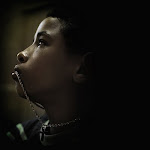In the heart of Copenhagen there is a loud shout going on and its all about what's happening with the earth's climate.. but not only that; it's about an age-old rift between the rich and the poor. Today, nearly 100,000 demonstrators march to show their dissatisfaction and put pressure as world leaders gather for an unprecedented event taking place just 4 miles away. The COP-15 is an unprecedented event and a veritable circus of activity and interests around the central theme of reaching a climate agreement that will put a stop to the earth's climate decline. With nearly 42,000 registered participants, 1500 journalists, some 110 heads of state from 194 nations, the possibility of reaching a legally binding agreement is becoming slimmer by the day. Today the demonstrations downtown have been mostly peaceful with the exception of 300 black-clad youths who capitalized on the moment, throwing bricks and smashing windows. They were a black spot on what is actually a colorful display of protest extending from the Arctic to Australia, intending to send a message to politicians to act now to save the earth and its peoples from the onslaught of climate change.
A draft agreement circulated Friday ignited significant debate over key issues: poorer countries complained that it failed to specify commitments on finance, the US contested it failed to commit China and other rapidly growing developing nations to strict emissions commitments, and the EU stated it did not go far enough to curb warming to 2 degrees celcius. Currently lack of agreement on these issues, and an apparent rift between China and the US, as well as lack of agreement between small island states and other developing nations who have allied with China, is blocking the process from moving forward.
This morning's debate was marked on both ends by an empassioned plea from the represenative of the small island state Tuvalu, Ian Fry, to save his island nation. "I woke up this morning crying", he said to the COP-15 President, Connie Hadegaard. "...And that is not easy for a grown man... the fate of my country rests in your hands." Despite disagreement by powerful nations such as India and Saudi Arabia, the COP-15 President promised not to "sweep the issues under the rug" in the midst of the pressured negotiations. The bold words of Mr. Fry, which cut a clear rift in the negotiations, symbolize the struggle of many small nations to defend not only economic rights, but their very existence.
Rich nations have pledged a climate fund of $10 billion and poor nations say this is insufficient. So the isues at stake in this debate are not only environmental; they cut to the core of the human rights debate and a litmus test of views on how nations should develop. "Some of the small islands will disappear, we accept that", said Crispin Gregoire, Dominican Ambassador of the 42-member Association of Small Island States (AOSIS), "but we want an agreement that will address our survival."
Which is one reason why police fill the streets of Copenhagen now...COP-15 has revealed the life-or-death issues at stake, and as the world awaits a decision which seems unlikely to some, the struggle in Copenhagen for a better life on and of the planet goes on...








